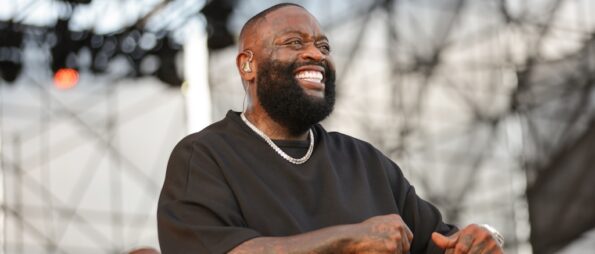While a fully-fledged solo debut continues to elude us, Jay Electronica and Jay Z have served up a fascinating collection of cerebral, forward-thinking hip-hop.
Not only did it take a self-imposed deadline to coax out of his creative exile, but it was a deadline derived from scripture. Chronicled in the Gospels of Matthew, the notoriously guarded artist that first set the world ablaze with his dizzying penmanship 13 years ago decided to spend the same window that Jesus endured the taunting of the devil to craft his own songs of praise. After a decade in limbo, a whirlwind 40 days and 40 nights birthed the arrival of his first official studio album. A day some thought would never arrive, the man that’d once been “trying to find the meaning of life in a corona” is now providing both solace and stimuli at a time of uncertainty with A Written Testimony.
The very embodiment of a non-conformist, it’s over four minutes until we hear a solitary syllable from Jay himself. Handing over the introductory duties to none other than Minister Louis Farrakhan, The Nation Of Islam leader’s call-to-arms sets the tone for a project that gives a great deal of thought to religion, philosophy and the elusive nature of our reality. Make no mistake, this is not the mythical debut album in which Jay Elec would forego the cloak-and-dagger approach in favor of showing us the sum total of his abilities. Instead, the New Orleans-born rapper opts to retain the air of mystery as opposed to unraveling it.
As the warped, accordion-inflected boom-bap of “Ghost Of Soulja Slim” emerges in its unorthodoxy, we see a different Jay leading the charge. An ardent supporter of Electronica since he signed with Roc Nation in late 2009, Sean Carter is so embedded into this project that it could’ve been billed as a collaborative album. Rather than being a ploy to entice the non-believers, Jay has treated this responsibility with the gravity it deserves and is rapping with the ferocity of a man still trying to make it out of Bed-Stuy. From the moment that he puffs his chest out to warn would-be enemies that if “you mouth off for the cameras, I make a silent movie,” it’s clear that he isn’t here to play.

Johnny Nunez/WireImage/Getty Images
Then, as you’re reeling from hearing that Hov verse in 2020, Jay Electronica responds in kind and reminds the faithful why they’d spent hours scouring the internet for every last morsel of his music. Declaring that “if it comes from me and Hov, consider it Quran, if it comes from any of those, consider it haram,” this opening verse sounds as if he’s picking up exactly from the moment that he was unveiled as a Roc Nation signee at The Box in New York. Granted, it’s apparent that he’s kept at least one foot in the contemporary world, dabbling in beat switches and recurring, faintly Griselda-esque ad-libs.
Speaking of mixing the old-school with the new-age, “The Blinding” begins with a classically lumbering beat from before its abruptly usurped by a co-creation between and MPC mastermind Araabmuzik. Occupied by both Jays, hearing the two lyrical assassins trade bars in quick succession really emphasizes that not only can Hov reconjure the tenacity of his early years, but that Jay Elec is a worthy sparring partner. Although the news that was appearing on a Jay Electronica project sent alarm bells ringing — a cynical attempt to attract younger listeners, perhaps– his affected hook adds to the overall effect rather than sounding like a marketing-oriented compromise.
This isn’t hip-hop as assembled for modern sensibilities. This is freeform expression; deconstructivism down to the core elements before being reassembled to meet a new self-prescribed template. Where many of the beats boil down to simple loops, this minimalism accentuates the power of the verses and ensures that lyrical content takes center-stage. Foreign as this concept may seem to some ears, it’s beautifully realized on “The Neverending Story.” The wish-fulfillment of hearing Hov on a delicate Alchemist instrumental aside, Jay Electronica adds new facets to his pre-existing mythology with one of his most revelatory and layered verses.

Theo Wargo/Getty Images
Spiritual to its roots but not in a heavy-handed way, Jay Electronica uses his theological compass to guide his own life rather than dictate yours, before segueing to pop culture-laced bars like “spread love like Kermit the frog, that permeate the fog, I’m at war like the dukes of hazard against the bosses of the hogs” at a moments’ notice. In a brief moment of respite from Hov spitting with Jaz-O era enthusiasm, the soulful, No I.D-helmed “Fruits of the Spirit” sees Jay Electronica broach his circular path to this moment where fans and detractors finally have something substantial to pour-over. Amid a nod to , he talks of taking “the underground railroad like Harriet” where others would’ve adhered to the industry’s standards and deceived themselves along the way.
A familiar offering to long-time fans, the ten-year-aged “Shiny Suit Theory” feels like it’s there just illustrate that the seeds of this project’s sonic direction were sown long ago before “Universal Soldier” veers away from archival samples to explore the world of ambient. As both Jay and Hov exercise the full breadth of their vocabulary, it’s Mr. Carter that emerges victorious on this occasion as he laments those who’d begrudge his wealth but “ain’t keep the same energy for the du Pont’s and Carnegie’s.”
Although rhyming alongside a GOAT-contender can be something of a double-edged sword when it comes to self-spotlighting, it can help keep things on track when there’s a mishap. Case in point, “Flux Capacitator”, on which one of Jay’s most insightful verses in years manages to rescue what was otherwise a garbled execution. Complete with a sample of “Higher” by and Jay-Z mimicking the refrain of Big Elt’s “Get The Gat,” his stern warning to opportunistic mourners and fairweather friends prevents it from being a complete miss.

Shareif Ziyadat/WireImage/Getty Images
Taking cues from the more abstract side of electronic music, “Ezekiel’s Dream” is a 6-minute odyssey in itself. Dealing with his own duality and the setbacks that he’s suffered over the years, Jay acknowledges the leeway he’s been afforded as he jests that “my debut album featurin’ Hov, man, this is highway robbery.” Filled with mesmerizing bars and a tasteful hook from his Roc Nation mentor, its ethereal sound blends neatly into the more agonizing subject matter of “A.P.I.D.T.A.” Using the permanence of our cell records to look at death from a fresh perspective, Jay and Hov ruminate on loss while acknowledging that it’s an inadmissible clause in the contract that allows us to experience the wonders of life. A touching crescendo to an album that demands dissection and further study, it’s only fitting that Jay Elec should pay homage to those he lost along the way in a chapter that many thought wouldn’t arrive.
Judged solely on the merits of these engrossing 40 minutes, this long-awaited “debut” corroborates Jay Electronica’s skills and keeps the romanticized idea of him as a hip-hop high priest afloat. That said, the scene-stealing presence of Hov means that it’s not quite the standalone tome of “ancient mathematics” and existential street-corner poetry that he’s always threatened to deliver. However, among A Written Testimony’s greatest attributes is that it leaves no room for impartiality. It’s impossible to be ambivalent about this project and no two people will interpret it the same way. Instead of being universally agreed upon, it’s sparking widespread, cross-demographical discussion and that’s what meaningful art should do. Let’s just hope that we don’t need to wait a whole decade for a follow-up.



